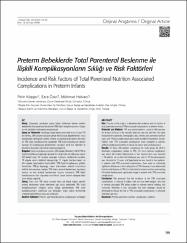Preterm Bebeklerde Total Parenteral Beslenme ile İlişkili Komplikasyonların Sıklığı ve Risk Faktörleri
Özet
Amaç: Çalışmada, yenidoğan yoğun bakım ünitesinde izlenen preterm bebeklerde total parenteral beslenme (TPB) ilişkili komplikasyonların sıklığını ve risk faktörlerini belirlemek amaçlanmıştır.Gereç ve Yöntemler: Yenidoğan yoğun bakım ünitesinde en az 24 saat TPB ile izlenmiş, 294 hastanın dosyaları geriye dönük olarak değerlendirildi. Hasta kayıtlarından demografik verileri, enteral ve parenteral beslenme durumları ve TPB ilişkili komplikasyonlar kaydedildi. TPB ilişkili komplikasyon gelişen hastalar ile komplikasyon gözlenmeyen hastaların klinik risk faktörleri ve beslenme durumları istatistiksel olarak karşılaştırıldı.Bulgular: Çalışma grubunu oluşturan 294 olgudan 85'inde (%28,9) TPB ile ilişkili komplikasyon geliştiği saptandı. En sık görülen komplikasyon sepsis (33 bebek) olup, 18 hastada karaciğer fonksiyon testlerinde bozulma, 19 olguda serum elektrolit dengesizliği, 11 olguda trombositopeni ve dört olguda hiperlipidemi tespit edildi. TPB ilişkili komplikasyon görülen hastalarda TPB'ye başlangıç süresi bakımından anlamlı istatistiksel farklılık bulunmazken, toplam TPB süresi, enteral beslenmeye başlanma zamanı ve tam enteral beslenmeye ulaşma zamanının TPB ilişkili komplikasyonu olan olgularda istatistiksel olarak anlamlı düzeyde daha uzun olduğu saptandı.Sonuç: Uzun süre TPB almak zorunda kalan çok düşük doğum ağırlıklı, enteral beslenmeyi tolere edemeyen ağır hasta bebeklerde TPB ilişkili komplikasyonların sıklığının artmış olduğu görülmektedir. TPB ilişkili komplikasyonların azaltılması için yenidoğan yoğun bakım ünitelerinde stratejiler geliştirilmesi sonucuna varılmıştır. Aim: The aim of the study is to determine the incidence and risk factors of total parenteral nutrition (TPN) associated complications in preterm infants.Materials and Methods: TPN was administered to a total of 294 neonates for at least 24 hours in the neonatal intensive care unit and their files were evaluated retrospectively. Demographic data, enteral and parenteral nutrition status and TPN associated complications were recorded from patients' records. Patients with TPN associated complications were compared to patients without complication in terms of clinical risk factors and nutritional status.Results: Of these 294 patients constituting the study group, 85 (28.9%) developed complications related to TPN. The most common complication was sepsis (33 infants). Deterioration in liver function tests was observed in 18 patients serum electrolit imbalance was seen in 19 thrombocytopenia was observed in 11 cases and hyperlipidemia was found in four patients. In patients with TPN associated complications, there were no statistically significant differences in the starting time of TPN. However, it was determined that the total duration of TPN, the initial time for enteral nutrition and reaching full enteral feeding were significantly longer in patients with TPN associated complications. Conclusion: We observed that the incidence of the TPN associated complications in critically ill babies with very low birth weights, who had to receive prolonged TPN being unable to tolerate enteral feeding, had increased. Therefore, it was concluded that new strategies should be developed to reduce the risk of TPN associated complications in neonatal intensive care units.
Kaynak
The Journal of Pediatric ResearchCilt
3Sayı
3Bağlantı
https://app.trdizin.gov.tr//makale/TWpFM05qVTJOZz09https://hdl.handle.net/20.500.12809/7168


















